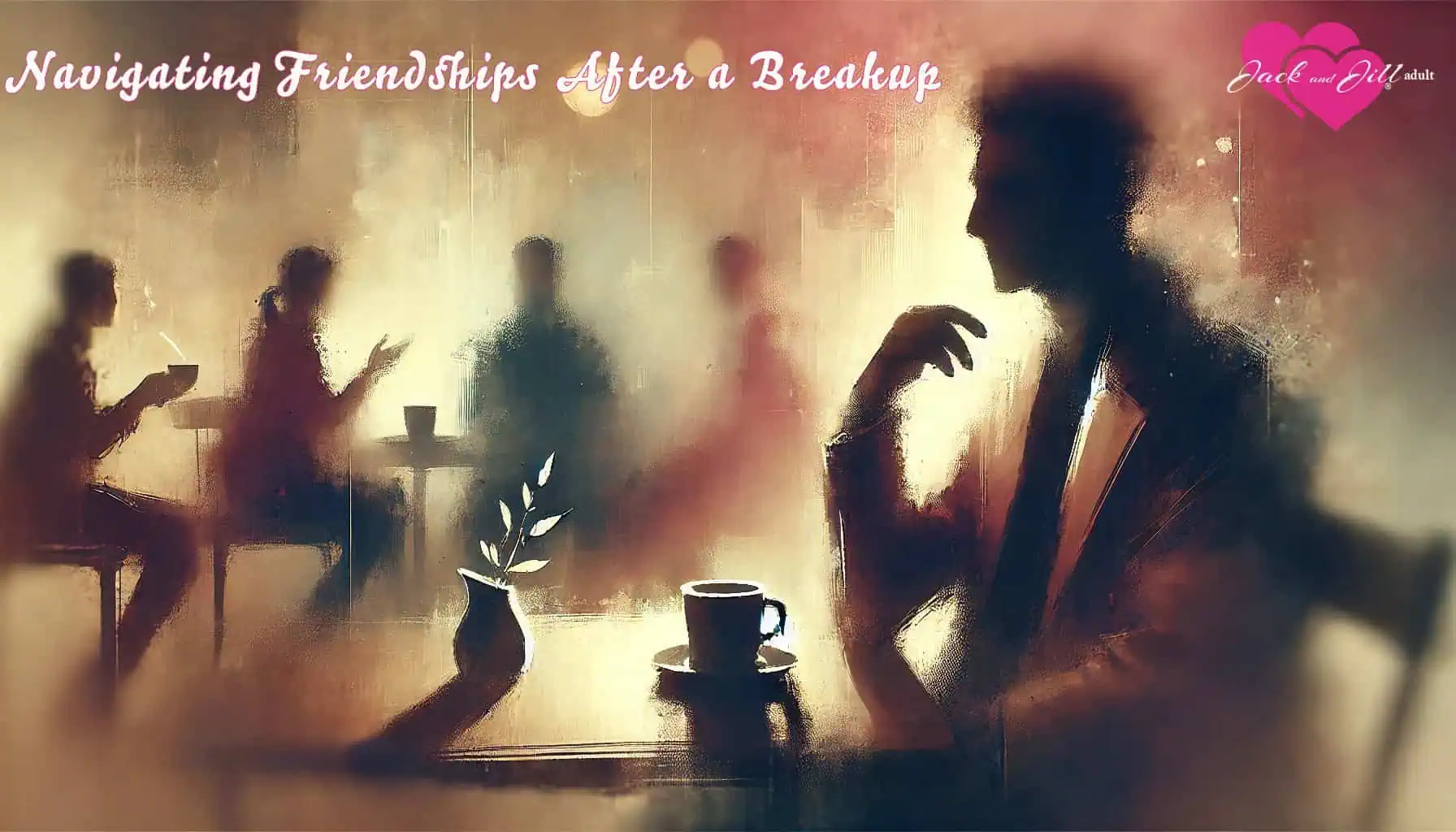
Navigating Friendships After a Breakup
Navigating Friendships After a Breakup is complex and tricky, especially when close relationships and mutual friends are involved, complicating the social dynamics. This healing guide will give you the insights and strategies to manage the mess when a relationship ends.
Breaking up with someone can be rough on your emotions and mind. Building emotional resilience during this time is crucial for managing the emotional turmoil. Spending time with friends and family can be a lifesaver.
Seeing a mental health expert can be super helpful in processing all the feelings and keeping your mental health on track. This is also a time for self-discovery and self-care as you learn to set boundaries and put yourself first. Hanging out with your squad and having a good close friend beside you can make this transition more accessible and manageable.
What causes a breakup?

Many things, such as disagreements, life changes, or conflicts, can cause romantic breakups. Sometimes, a breakup happens when both partners realize the relationship has run its course, often due to life changes or different priorities, including the need to establish emotional boundaries. These changes can be moving to a new city, starting a new job, or entering a new phase of life.
In other cases, a romantic relationship can end because of toxic behavior, manipulation, constant arguing, or a lack of respect for boundaries. When one partner consistently disrespects the other’s boundaries or engages in harmful behavior, it can create an unsustainable situation that leads to the end of the relationship. This is especially tricky when mutual friends are involved, as it can split the entire social support system.
The emotional impact

Breakups are often among the most challenging emotional experiences. The end of a relationship can leave a deep sense of loss, confusion, and sadness. These emotions can be overwhelming and affect every aspect of daily life.
One of the primary emotions felt after a breakup is grief. Similar to mourning a death, the loss of a significant relationship can trigger a grieving process. This process can include denial, anger, bargaining, depression, and eventually acceptance. Each stage brings its own set of challenges and emotions.
Loneliness is another familiar feeling after a breakup. The sudden absence of a partner can create a void, leading to feelings of isolation. Even when surrounded by friends and family, the absence of the person who was once a central part of your life can feel profoundly lonely.
Self-doubt and loss of self-esteem often accompany a breakup. Questioning one’s worth and feeling insecure about the future is expected. These feelings can be particularly intense if the breakup was unexpected or the relationship ended negatively.
Anger and resentment can also surface. These emotions might be directed at the ex-partner, oneself, or the circumstances that led to the breakup. While these feelings are natural, they can be challenging to manage and can prolong the healing process if not addressed.
Navigating Mutual Friendships After a Breakup

Mutual friendships can become complicated after a breakup. Friends once shared by both partners might feel torn between loyalties, leading to tension and awkwardness. It’s essential to approach these relationships with sensitivity and respect.
Open communication with mutual friends is crucial. Let them know you value their friendship and understand if they wish to remain neutral. This can help alleviate any pressure they might feel to take sides.
Setting boundaries is also important. It’s okay to express your need for space or to ask friends to avoid discussing the ex-partner in your presence. Clear boundaries can help create a more comfortable environment for everyone involved.
Finding new activities or groups to join can be beneficial. Expanding your social circle can provide a fresh start and help you build new connections, reducing the reliance on mutual friends for social support.
It’s also helpful to focus on self-care during this time. Engaging in activities that bring joy and fulfillment can aid in the healing process and help rebuild self-esteem. This can make it easier to navigate mutual friendships without feeling overwhelmed by the breakup.
In some cases, it might be necessary to take a temporary break from certain mutual friends. This can provide the space needed to heal and gain perspective. Over time, as emotions settle, it may be possible to reconnect on more stable terms.
Finally, seeking professional support, such as therapy, can be incredibly beneficial. A therapist can provide guidance and strategies for managing the emotional fallout of a breakup and navigating complex social dynamics, including mutual friendships.
Emotional Aftermath

Dealing with the emotional aftermath of a breakup is hard; it involves navigating a messy web of emotions like anxiety, stress, depression, loneliness, and emotion significant turmoil.
The emotional impact of a lost relationship can be significant, so you need to acknowledge and process those feelings. Grief is a mal and natural response to the end of a romantic relationship, and giving yourself space to grieve is a big part of healing. Seeking support from friends, family, and even a mental Practiself-care-carel can help during this rough time.
Practicing self-care like journaling, exercising, and spending time with supportive people can help reduce the emotional load. Focusing on healthy relationships and setting clear boundaries can help you Heal with yourself, your sense of self, and your personal goals; taking with the emotions is okay. Aftermath is a journey, and taking the time to heal is okay.
Allow yourself to grieve.

Giving yourself time to grieve after a breakup is part of permitting yourself to accept what you must do in your journey. Please don’t be hard on yourself; remember, it’s okay not to be okay. Seek support from close friends and prioritize comfort and understanding during this time.
Prioritize your mental health because the grieving process is essential as a patient. Achieving emotional closure is an important step in the grieving process.
People tend to move in different directions after a breakup, and you need to acknowledge and accept those changes. Taking a break from certain activities or routines can also help you process your emotions better. Remember to give yourself time for self-care, an ordinary and necessary form of self-care and recovery.
Self-care for emotional well-being

After a breakup, practice emotional self-care for your emotional and mental health. Your physical and emotional body should be your priority. This means exercise, healthy eating, and sleep. Self-care also means nurturing your mind and spirit through meditation, journaling, or time in nature. These can help you manage the stress and emotional chaos of a breakup.
Trying new things can be a great way to focus on personal growth and escape the emotional mess of a breakup. You can discover new interests and passions you never knew you had. Whether painting, learning an instrument, or joining a new hobby or fitness class, these can give you a sense of accomplishment and happiness. They can also be a distraction to help you move forward and find new sources of joy.
After a breakup, it’s good to work on other positive relationships. Spend time with friends and family who can offer support and understanding. These close relationships can be a solid foundation as you navigate your feelings and heal. Surround yourself with caring and supportive people, and you’ll feel less alone and more connected, which is good for your mental health.
Personal growth is another form of self-care. Use this time to think about what you want for yourself and your future. Set new goals or revisit old ones you may have put on the back burner. This period of self-discovery can be influential and help you build more self and direction. Personal growth often comes from challenging experiences, and a breakup can be an opportunity to learn more about yourself and what you need to survive.
If you’re struggling to deal with a romantic breakup and its emotional aftermath, don’t hesitate to get professional help. A mental health professional can guide and support you in working through your emotions and developing healthy coping mechanisms. Therapy can be a safe space to express yourself, gain insight into your experiences, and help you move forward positively.
Mutual friends

Navigating mutual friends after a breakup can be tricky and complicated, especially when managing social interactions. Approach these relationships with sensitivity and clear communication to avoid unnecessary conflict. Mutual friends may feel caught in the middle, not knowing how to support both parties without taking sides.
Open and honest conversations about your boundaries and needs can help maintain these friendships while respecting the emotional space of everyone involved. Give yourself and your closest friends time to adjust to the new dynamics.
Seeking support from others and focusing on self-care can provide stability during this transition. Remember, navigating mutual friendships between friends requires patience, empathy, and acceptance that these relationships will evolve as everyone moves forward.
Sharing the same friends in a friend group with an ex means you may see each other and feel awkward emotions. Learning to manage those emotions and set emotional boundaries is vital to continuing to share mutual friends.
Acknowledge that feeling uncomfortable is normal, and those feelings will fade over time. Communicate with your mutual friends about your feelings and any boundaries you need to set to feel comfortable in social situations.
Make new friendship connections and grow your social circle. When you’re ready, put effort into your existing friendships and make new ones.
Growing your social circle after a friend’s breakup can be challenging and fun. New friendships can bring new perspectives and extra emotional support to help you move forward after the friendship breakup.
Focus on other friendships.

After a breakup, you must nurture other friendships to grow your social circle and provide support. Spend time with old friends who offer stability, lost friendship, and support.
Reconnecting with these friends will remind you of your strong connections with other friends outside of your past romantic relationship and provide a comfort zone.
Making new friends can be challenging and a great experience that adds to your life. Put effort into meeting new people and forming new connections through social events, hobbies, or mutual or other friends.
Growing your social circle provides extra support, new perspectives, and opportunities for personal growth. Invest in old and new friendships, and you’ll have a balanced and happy social life and network during this transition.
Give yourself space and time to heal.

Moving forward after a breakup means balancing self-reflection and taking action to rebuild your life. Achieving emotional closure is an integral part of healing. You need to acknowledge your emotions and give yourself time to heal.
This might mean grieving the relationship, seeking support from friends and family members, and self-care to look after your mental health. Knowing it’s okay to feel sad, angry, or even relieved will help you process your emotions.
Focusing on personal growth can be tremendously beneficial as you move forward. Set new goals for your career, hobbies, or personal development.
Do things you enjoy and are passionate about and get a sense of purpose and fulfillment. Try new things and step out of your comfort zone, and you’ll find new opportunities and your best friends again. Remember, this is a time to get to know yourself again and move forward with hope and courage.
Conclusion
You can get over a breakup, and you need to prioritize your mental health throughout. Acknowledge and process your emotions first. Give yourself the time and space to grieve and recover. It’s okay to feel sad, angry, or confused; these emotions are a natural part of healing.
Seek support from trusted friends and family, and don’t hesitate to contact a mental health specialist if needed. Talking about your feelings and experiences can provide relief and clarity. Professional guidance can offer coping strategies and a structured path to recovery.
Be around positive people and friend groups who uplift you. Look after existing friendships and be open to new connections that bring new perspectives and support. Engaging in social activities can distract you from the pain and remind you of the joy in relationships.
Prioritize your well-being and self-care. Engage in activities that make you feel good, whether it’s exercising, pursuing hobbies, or simply relaxing. Taking care of your physical health is just as important as addressing your emotional needs. By focusing on self-care, you’ll rebuild your life and find happiness in your life circumstances in this new chapter.
As you move forward, remember that this experience, while painful, is also an opportunity for growth. By reflecting on what you’ve learned, you can develop a deeper understanding of yourself and what you want in future relationships. Building emotional resilience will help you navigate future challenges with greater strength and confidence, ultimately leading you to a more fulfilling and balanced life.
In time, you’ll find that the heartbreak diminishes, and new opportunities for love and happiness emerge. By allowing yourself to heal and grow, you’ll be better prepared to embrace these opportunities with an open heart and a positive outlook.

